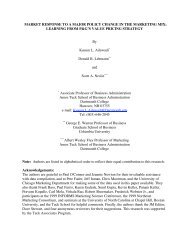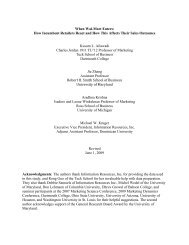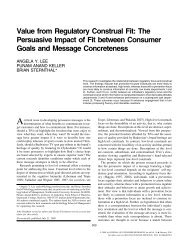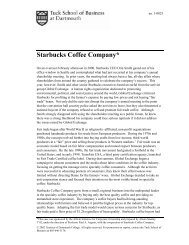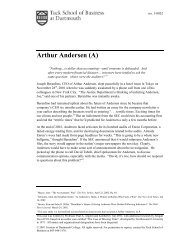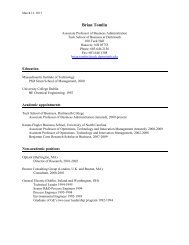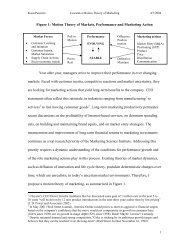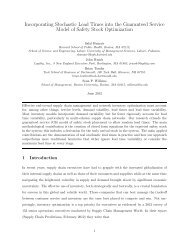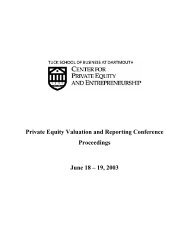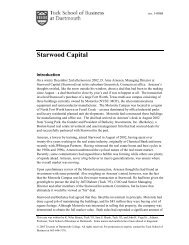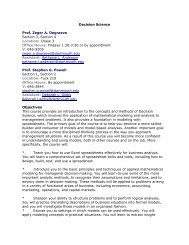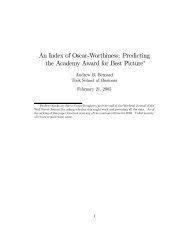tax notes international - Tuck School of Business - Dartmouth College
tax notes international - Tuck School of Business - Dartmouth College
tax notes international - Tuck School of Business - Dartmouth College
You also want an ePaper? Increase the reach of your titles
YUMPU automatically turns print PDFs into web optimized ePapers that Google loves.
exports, and the recent drop in oil prices has created a<br />
difficult economic scenario that will affect government<br />
funding and the cash flow <strong>of</strong> private enterprises. (For<br />
prior coverage <strong>of</strong> the Tax Fairness Bill, see Doc 2008-<br />
472 or 2008 WTD 7-5.)<br />
The new law extends a 10 percentage point reduction<br />
in the 25 percent corporate income <strong>tax</strong> rate to financial<br />
entities and cooperatives that reinvest their<br />
pr<strong>of</strong>its by increasing their capital and purchasing assets<br />
that would help their operations.<br />
The amendments provide for the reduction or dismissal<br />
<strong>of</strong> the advance income <strong>tax</strong> payment when there<br />
are economic effects for a given industry or economic<br />
sector. To be approved by the president, the Ministry <strong>of</strong><br />
Economy and Finance and the <strong>tax</strong> administration must<br />
issue technical reports <strong>of</strong> an income reduction in the<br />
industry or economic sector. The reduction or dismissal<br />
<strong>of</strong> the payment must be evaluated on a yearly basis.<br />
The new law establishes 2009 as a transition year<br />
regarding withholding <strong>tax</strong> on interest paid on foreign<br />
credits. The normal 25 percent withholding rate over<br />
interest, which does not exceed the Ecuadorian Central<br />
Bank’s rate, has been reduced to 5 percent until December<br />
31, 2009. Payments made by financial entities<br />
are free from withholding during the entire year.<br />
The capital flight <strong>tax</strong> rate has been increased from<br />
0.5 percent to 1 percent, and all but one exclusion have<br />
been eliminated. Therefore, all payments (including<br />
those made for imports) are charged with the 1 percent<br />
capital flight <strong>tax</strong>. Individuals can leave the country<br />
with up to US $8,570 in cash free <strong>of</strong> <strong>tax</strong>.<br />
All imports whose payment is made with funds located<br />
abroad are deemed to be made with local money<br />
and therefore will be <strong>tax</strong>ed.<br />
To encourage financial entities and those entities<br />
participating in the stock market to bring billions <strong>of</strong><br />
Ecuador dollars <strong>of</strong> their clients’ deposits into the country,<br />
the National Congress has created a new <strong>tax</strong>. This<br />
<strong>tax</strong> will be charged on all deposits held abroad by the<br />
above-mentioned companies at a monthly rate <strong>of</strong> 0.084<br />
percent <strong>of</strong> the amount <strong>of</strong> their assets held abroad.<br />
♦ Roberto M. Silva Legarda, pr<strong>of</strong>essor <strong>of</strong> <strong>tax</strong> law,<br />
Pontificia Universidad Católica del Ecuador, Quito, and<br />
partner, Tributum Consultans<br />
European Union<br />
EUROPEAN UNION<br />
Austrian Leasing Rules Incompatible<br />
With EC Treaty, ECJ Says<br />
Austrian rules that denied an investment-premium<br />
<strong>tax</strong> advantage to lessors <strong>of</strong> goods used by lessees in<br />
other EU member states violated article 49 <strong>of</strong> the EC<br />
Treaty (the freedom to provide services), the European<br />
Court <strong>of</strong> Justice said in its December 4, 2008, judgment<br />
in Jobra Vermögensverwaltungs-Gesellschaft mbH v.<br />
Finanzamt Amstetten Melk Scheibbs (C-330/07). (For the<br />
judgment, see Doc 2008-25509 or 2008 WTD 235-10.)<br />
Background<br />
Jobra was an Austrian company with a wholly<br />
owned subsidiary, Braunsh<strong>of</strong>er, also an Austrian resident<br />
company. Jobra purchased some trucks and leased<br />
them to Braunsh<strong>of</strong>er, which used the trucks in EU<br />
member states other than Austria. Consequently, Jobra<br />
was denied an investment-premium <strong>tax</strong> advantage because<br />
the leased assets were used ‘‘primarily abroad’’<br />
and not in Austria.<br />
The Austrian <strong>tax</strong> rules at issue made the <strong>tax</strong> advantage<br />
available only if the assets had been used at an<br />
Austrian place <strong>of</strong> business for at least half the time<br />
they had been in use. Jobra argued that the rules were<br />
incompatible with its rights under EC Treaty articles<br />
43 (freedom <strong>of</strong> establishment) and 49 (freedom to provide<br />
services).<br />
Considerations<br />
The ECJ noted that the leasing <strong>of</strong> vehicles is a service<br />
under article 50 <strong>of</strong> the EC Treaty.<br />
The Court went on to determine that the Austrian<br />
<strong>tax</strong> regime at issue — ‘‘which applies a less favourable<br />
<strong>tax</strong> regime to investments in assets which, once they<br />
have been hired out for remuneration, are used in other<br />
Member States, than to investments in such assets that<br />
are used domestically — is likely to discourage undertakings<br />
that would be eligible for that <strong>tax</strong> advantage<br />
from providing rental services to economic operators<br />
that carry out their activities in other Member States.’’<br />
Justifications<br />
The ECJ examined and rejected three possible justifications:<br />
the need to ensure balance in the allocation<br />
<strong>of</strong> <strong>tax</strong>ing rights, the need to safeguard the coherence <strong>of</strong><br />
the national <strong>tax</strong> system, and the need to prevent abuse.<br />
Allocation <strong>of</strong> Taxing Rights<br />
The Austrian and German governments argued that<br />
the investment-premium rules at issue were consistent<br />
with the allocation <strong>of</strong> <strong>tax</strong>ing rights between the member<br />
states. They pointed out that the conditional granting<br />
<strong>of</strong> the investment-premium <strong>tax</strong> advantage ‘‘aims to<br />
TAX NOTES INTERNATIONAL FEBRUARY 2, 2009 • 391<br />
(C) Tax Analysts 2009. All rights reserved. Tax Analysts does not claim copyright in any public domain or third party content.



